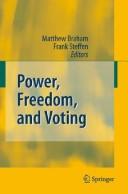| Listing 1 - 5 of 5 |
Sort by
|
Book
ISBN: 3790802662 3662004135 3662004119 9783790802665 Year: 1982 Publisher: Würzburg: Physica-Verlag,
Abstract | Keywords | Export | Availability | Bookmark
 Loading...
Loading...Choose an application
- Reference Manager
- EndNote
- RefWorks (Direct export to RefWorks)
Political systems --- Voting --- Power (Social sciences) --- Game theory --- Social choice --- Vote --- Pouvoir (Sciences sociales) --- Théorie des jeux --- Choix collectif --- Théorie des jeux
Book
ISBN: 3790802999 Year: 1984 Publisher: Würzburg
Abstract | Keywords | Export | Availability | Bookmark
 Loading...
Loading...Choose an application
- Reference Manager
- EndNote
- RefWorks (Direct export to RefWorks)
Political systems --- Coalition (Social sciences) --- Coalition governments --- Coalition (Sciences sociales) --- Gouvernements de coalition --- Coalitions.
Book
ISBN: 1280617810 9786610617814 3540299483 Year: 2006 Publisher: Berlin, Heidelberg : Springer Berlin Heidelberg : Imprint: Springer,
Abstract | Keywords | Export | Availability | Bookmark
 Loading...
Loading...Choose an application
- Reference Manager
- EndNote
- RefWorks (Direct export to RefWorks)
Die vorliegende Einführung gibt einen umfassenden Überblick über den neuesten Stand der Spieltheorie. Die Darstellung legt den Schwerpunkt auf die Vermittlung der grundlegenden Ideen und der intuitiven Konzepte. Das Buch setzt nur solche mathematischen Grundkenntnisse voraus, wie sie von Studenten im Hauptstudium wirtschaftswissenschaftlicher Ausbildung erwartet werden. Anhand von zahlreichen Beispielen wird illustriert, wie sich spieltheoretische Konzepte auf ökonomische Fragestellungen anwenden lassen, und es wird gezeigt, wie spieltheoretische Konzepte neue Einsichten für das Verständnis der Grundlagen ökonomischer Theorie liefern können. Die Neuauflage geht auf aktuelle Entwicklungen der Spieltheorie ein.
Economic theory. --- Game theory. --- Social policy. --- Operations research. --- Decision making. --- Political science. --- Sociology. --- Economic Theory/Quantitative Economics/Mathematical Methods. --- Game Theory, Economics, Social and Behav. Sciences. --- Social Policy. --- Operations Research/Decision Theory. --- Political Science. --- Sociology, general. --- Economics.

ISBN: 1281241857 9786611241858 3540733825 3540733817 364209242X 9783540733812 Year: 2008 Publisher: New York: Springer,
Abstract | Keywords | Export | Availability | Bookmark
 Loading...
Loading...Choose an application
- Reference Manager
- EndNote
- RefWorks (Direct export to RefWorks)
Power, Freedom, and Voting is an interdisciplinary book that presents a comprehensive insight into current research by economists, mathematicians, philosophers and political scientists on three intimately related concepts that are at the heart of theories of democracy and social welfare. The editors have brought together some of the leading scholars in the different fields to create a distinctive volume. Chapters include contributions on foundational and methodological issues in the definition and measurement of power and freedom and empirical studies of power and coalition formation in voting bodies. The volume also contains contributions that make an effort to bridge the gaps between different disciplinary approaches, including one on the importance of Machiavelli’s writing as a reference point for modern political theory, and others on the related concepts of fairness and responsibility. A majority of the chapters make use of game theory.
Voting. --- Voting --- Power (Social sciences) --- Economic aspects. --- Empowerment (Social sciences) --- Political power --- Exchange theory (Sociology) --- Political science --- Social sciences --- Sociology --- Consensus (Social sciences) --- Polls --- Elections --- Politics, Practical --- Social choice --- Suffrage --- Economics. --- Economic theory. --- Political science. --- Economics, general. --- Economic Theory/Quantitative Economics/Mathematical Methods. --- Political Science. --- Political Philosophy. --- Philosophy of the Social Sciences. --- Philosophy. --- Social philosophy --- Social theory --- Political philosophy --- Administration --- Civil government --- Commonwealth, The --- Government --- Political theory --- Political thought --- Politics --- Science, Political --- State, The --- Economic theory --- Political economy --- Economic man --- Management science. --- Political philosophy. --- Philosophy and social sciences. --- Social sciences and philosophy --- Quantitative business analysis --- Management --- Problem solving --- Operations research --- Statistical decision --- Holler, Manfred Joseph, - 1946 --- -Economics. --- -Voting. --- -Holler, Manfred Joseph, - 1946-
Book
ISBN: 3030448231 3030448223 Year: 2020 Publisher: Cham : Springer International Publishing : Imprint: Springer,
Abstract | Keywords | Export | Availability | Bookmark
 Loading...
Loading...Choose an application
- Reference Manager
- EndNote
- RefWorks (Direct export to RefWorks)
This book introduces readers to basic game theory as a tool to deal with strategic decision problems, helping them to understand the complexity of such problems – to extract a solution, if possible – and to manage the complexity by revising the game if appropriate. The authors discuss basic decision situations modeled as Prisoners’ Dilemma, Chicken Game, and Stag Hunt Game, as well as concepts like the Nash equilibrium, Trembling Hand Perfectness, Rationalizable Strategies and the Theory of Moves to introduce game theoretic thinking. Further, the book presents pioneers of strategic thinking, e.g., Sun Tzu, Machiavelli, Adam Smith, and Goethe, and includes cases of conflict and cooperation to illustrate practical applications. Readers learn to apply game theory in business and in daily life – to manage their decision problems and to better understand the decision problems of others.
Game theory --- Decision making --- Deciding --- Decision (Psychology) --- Decision analysis --- Decision processes --- Making decisions --- Management --- Management decisions --- Choice (Psychology) --- Problem solving --- Computer programs. --- Social aspects. --- Game theory. --- Leadership. --- Game Theory. --- Business Strategy/Leadership. --- Game Theory, Economics, Social and Behav. Sciences. --- Ability --- Command of troops --- Followership --- Games, Theory of --- Theory of games --- Mathematical models --- Mathematics --- Teoria de jocs --- Presa de decisions
| Listing 1 - 5 of 5 |
Sort by
|

 Search
Search Feedback
Feedback About UniCat
About UniCat  Help
Help News
News